#and there's this underlying narrative about how people change over time and a lot of it from leon's perspective is because of trauma/PTSD
Explore tagged Tumblr posts
Text
hyperfixations really will have you imagining a 2 hour video essay on some white guy video game character huh 😪
#HELP#thank GOD i don't have video editing capabilities i would be SO annoying#anyways there's a guy on youtube who does FASCINATING breakdowns of video game villains#i watched one on miquella eldenring and i watched one on osmund saddler re4 (2023)#i would LOVE to do a villain analysis on chronos hades2game as well. he's a fascinating villain to me#well. i have WRITING capabilities. hmmmmm#character analysis is so fun to do frfr i love examining the little guys in my video games like they're specimen#I COULD DO ONE ON LINK BOTW#(he's also a fascinating character to me idk)#help i'm discovering my true power and i don't have time for this!!!!!#i also want to do one on the character development leon has in the re2 and 4 remakes because i think its really fascinating#and i do not see it talked about enough. probably because he's peak male fantasy but i'm shaking him violently#PLEASE I NEED TO TALK ABOUT PERSONAL CHANGE AND ITS RELEVANCE IN RESIDENT EVIL 4 (2023)#ITS EVERYWHERE literally the main antagonist is trying to convince you to join him and give up control of your body#and there's this underlying narrative about how people change over time and a lot of it from leon's perspective is because of trauma/PTSD#that he's running from!!! he's not really handling it and it's coming back around again and it shows!!#he's got this sort of drive to save as many as he can but literally not long after his introduction as a character there's this really harsh#reality check that it's not possible to save everyone. but leon keeps trying and he keeps failing#and these failures stay with him into re4 and throughout that game too.#HHHHHHHRG this game is so good for no reason why is it so GOOD AUGH#anyways :) i'll stop losing my mind over this one specific blond dude in my tags now#oh god i hope no one sees these tags <- in denial#i really could go on for 2 hours about leon kennedy huh#hell i could do it for melinoë too. AND SHE ONLY HAS ONE GAME
13 notes
·
View notes
Text
SUZANNE COLLINS: SOTR EXCLUSIVE EDITIONS INTERVIEW
This is a transcript from the Barnes & Noble / Waterstones exclusive edition interview. To my knowledge, they are the same.
Not to be confused with interview on her website, which you can find here.
transcript below
DL: Did you always know you’d write a novel about the second Quarter Quell? If not, what compelled you to return to this particular point in the Hunger Games timeline?
SC: I always start with the underlying ideas—in this case, implicit submission, the uncertainty of inductive reasoning, propaganda, love—and they find their way to the story that supports them. But yes, I think I did want to do Haymitch’s story because I’ve always known that the version Katniss and Peeta saw on the train was very misleading. When I landed on implicit submission and its dependency on propaganda, Haymitch’s was the natural tale to tell. Just like the state of nature debate led naturally to Coriolanus’s story.
DL: The quote at the start of the book from the philosopher David Hume is a very telling one. It starts, “Nothing appears more surprising to those, who consider human affairs with a philosophical eye, than the easiness with which they are governed by the few; and the implicit submission, with which men resign their own sentiments and passions to those of their rulers.” This feels like a key to the entire book.
SC: If all people do is read the full Hume quote and discuss it, this book has been a win for me. This quote invites so many questions. Like, “Do you think Hume is right? As human beings, do we ultimately end up being governed by a few people? Not in, say, a totalitarian state, but in a democracy?” (After thinking about it, every single person I asked about this said yes. No one seemed happy about it.) “But why have we resigned our own sentiments and passions to those rulers? Why are we implicitly submitting to this? Especially since force is on our side, as the governed.” Hume answers that for us. We’re allowing ourselves to be controlled by “opinion.” And that’s where propaganda comes in.
All right, then, “What propaganda do we all consume on a daily basis that maintains this status quo? Is it harder to maintain in an autocracy or a democracy where we pride ourselves on our intellectual or political freedom? How much propaganda does it take to make you think that implicit submission is what you want? Is it inevitable? Is there a way to protect ourselves against it? What would that entail?”
DL: Haymitch is starting at a very different place than Katniss or Coriolanus—while his life has had its sadness, it’s largely been a good life so far. How does that change the stakes within the novel?
SC: Yes, his life has been largely good. A loving family, good friends, the love of his life. A sweet part-time job that may lead to a profitable, if illegal, career. He’s happy except for the shadow of the Games that hangs over them all. So, emotionally, his loss is the greatest because he has the most to lose. And unlike Katniss and Coriolanus, who have loved ones to the end, Snow tries to strip Haymitch of everything: family, friends, lover, job, community, happiness, and the freedom to love anyone. His personal stakes couldn’t be higher.
DL: What was it like to be creating a new work that you’d already loosely outlined in Catching Fire?
SC: Actually, it helped. Younger me provided a protagonist, his arena, his overall arc, and some of the cast, including Maysilee Donner. Having to build off the recap, not having everything to decide, meant some extra challenges on the plotting side, but ultimately it was freeing. I just had to work within what was established. Of course, knowing that the narrative had been manipulated into a piece of Capitol propaganda gave me a lot of freedom as well.
DL: It’s such an interesting scenario, to have our very reliable narrator understand that he is surrounded by so many unreliable narrators — and that, in fact, unreliable narration is a powerful political tool. The “card-stacking” that helps him a little in the beginning (with Plutarch using the manipulation as an excuse to give Haymitch time with his family) ends up being existentially overwhelming when Haymitch watches the “recap” of the Games and realizes how history is truly written by the victory (and not the Victor). To me, this felt like the biggest revelation to Haymitch — the sheer degree of manipulation. Can you talk a little about how this revelation about propaganda sits within the larger scope of the series?
SC: After he watches the reaping on the train, Haymitch realizes that he’s the Gamemakers’ puppet and that they will manipulate his image and actions to serve their needs. Within the arena, he can only wonder what they’re showing the audience. But the full force of their deception doesn’t hit him until he sees how completely they’ve changed his story the night he’s crowned. Remember, too, that in order to appease Snow and protect his loved ones and, when that fails, to fulfill his promise to Lenore Dove, he has to carry the Gamemakers’ narrative forward as the absolute truth. It’s an enormous burden that he bears alone because all of his allies who lived the truth are dead. Keeping the real version straight in his own head while promoting the fabricated version would require constant vigilance. But deep down, even through his white liquor fog, he realizes it’s imperative that he do it. If he can’t distinguish between the two, the Capitol wins. This foreshadows Peeta’s hijacking in Mockingjay and reinforces the question the whole series asks about the information we’re consuming: “Real or not real?”
DL: If I could give you a time machine back to when you were writing Catching Fire, would you have asked yourself to do anything differently?
SC: No, but maybe in the Mockingjay book. I might have shortened the period between Haymitch being crowned victor and when he loses his family. It doesn’t need to be two weeks. Although it does give Snow an additional window to torment him in the Capitol. But really, he could have gone straight home after the Victor’s Ceremony.
DL: Besides Haymitch, was there any other character from the trilogy that you particularly enjoyed revisiting in Sunrise?
SC: I love doing all of them: Plutarch, Effie, Beetee, Mags, Wiress, Burdock, Asterid. Getting to share who they were and what motivated them. They didn’t arise fully formed in the trilogy. All the characters are on journeys. Beetee losing Ampert, Effie clinging to her Capitol beliefs, Asterid healing the sick in 12, Plutarch still staying in the games. Everybody has their own story.
DL: One of the most fascinating things about seeing the Games play out over time — going from the Tenth to the Fiftieth to the Seventy-fourth and Seventy-fifth — is understanding both the evolution of the Games and the evolution of the roles within the Games. In particular, I’d love to ask you about the contrast between Drusilla and the Effie of the Trilogy. There seems to be a profound generational difference that shapes their view of their role in the Games — and, indeed, seeing the start of Effie’s relationship here made me suddenly understand the dynamic that must have governed District 12 tributes for the next twenty-five years. Can you talk about what makes Drusilla tick versus what ultimately makes Effie tick?
SC: As escorts, both Drusilla and Effie are ambassadors for the Hunger Games. Drusilla who lived through the cruelties of the Dark Days, has channeled her experience into vengeance against the districts. She’s dehumanized her enemy, referring to them as beasts and pigs, and she has no qualms about ushering the piglets into the arena. Effie, born decades after the war, has embraced the Hunger Games as her patriotic duty. She’s been raised on them as necessary evil and a reminder of a war that Panem can never afford to repeat. Unlike Drusilla, she believes all the participants have a noble role to play. That begins to wear thin over the years. Every Games it becomes harder to justify the atrocity. You can see her clinging to good manners for reassurance of humanity’s decency. But in terms of the Hunger Games, Effie being assigned as their escort was a lucky break for District 12. She might be ridiculous, but she’s not malicious.
DL: Even though Maysilee is mentioned in Catching Fire, we really get to know her for the first time in this book. In many ways, she’s not so much defined by her privilege as she is by her lack of control over her life — when we first talked about her, you said she was “indentured into a life she doesn’t want.” What do you think fuels Maysilee, both in the arena and out of it?
SC: Rage. She’s one of the angriest characters I’ve ever written. She’s mad about the injustice of the world she’s born into and not it threatens and limits her life on every level. Before she’s reaped, that just manifests as meanness. But once she’s reaped, she begins to evolve and focus that emotion on the Capitol. She remembers who the enemy is.
DL: Snow makes quite an appearance when he arrives at Plutarch’s apartment. What was it like to see him in this era, after spending so much time with his younger self when writing Ballad?
SC: When I started working on this book, for the first time Snow and I were about the same age. We’re both entering our third act. I could feel his middle-agedness in mind and body, imagine his lost and realized dreams, and sense the cost of maintaining them. He's devoted his whole life to controlling Panem. But the work will never be done. It's exhausting.
Emotionally, he's beginning to reflect back on his life. His loves and losses. His resentment at the Heavensbee library when his own childhood books were burned for warmth, his cynicism over Haymitch's romance, his fear and loathing of District 12. I enjoyed having Lucy Gray's memory rise up and disrupt his life.
DL: And poor Haymitch doesn't even know why he's setting Snow off! But that does lead me to a question about Lenore Dove, who has grown up in a very different Covey world than Lucy Gray. How do you feel her outlook is shaped by her Covey roots?
SC: Lenore Dove romanticizes the Covey's prewar days as itinerant musicians on the open road. She also knows the losses that followed, the murdered parents and orphaned Covey children. And in particular, she's haunted by the fate of Lucy Gray. She wears bright bits of Lucy Gray's dress about her person and keeps her forbidden lyrics alive in private performances for Haymitch and Burdock. The Capitol has never meant anything but oppression and pain for her people; and that fuels her desire to bring it down.
DL: And how did Poe become such a part of the book?
SC: Haymitch's love needed a name. Since she's Covey, that starts with a ballad. I knew she'd died young, as Haymitch mentions this in Mockingjay. So, love of his life - her early death + his relentless grief = Edgar Allan Poe. I’m right back at the Romantic poets again. Even then, I’ve got several poems to choose from — “Annabel Lee,” “Ulalume,” “Lenore,” “To One in Paradise” — but I couldn’t resist “The Raven.”
DL: One of the things I love about Ballad and Sunrise is that they make the series much more about “the long game,” showing that the events of the trilogy don’t happen because the right girl shows up at the right time, but because of decades of planning. In many ways, Plutarch’s extremely ambiguous role is the biggest acknowledgment we have of long-game tactics. I don’t want you to try to pin him down here — I know he is ambiguous for a reason — but perhaps you could discuss his role.
SC: Plutarch’s the master of the long game. In Sunrise, we see him as a young man who’s convinced the government needs overthrowing, but he’s just taking his first baby steps. by the time we get to the trilogy, he’s masterminding the rebellion. He’s built a network in both the districts and the Capitol. He’s found an army in District 13 and allied with Coin. When Katniss shows up, he’s got a Mockingjay for his propaganda. He orchestrates the Airtime Assault that brings down the Capitol. And he manages to do all of this while convincingly playing a Gamemaker.
He doesn’t glorify humanity. At the end of the war, he tells Katniss, “We’re fickle, stupid beings with poor memories and a great gift for self-destruction. Although who knows? Maybe this will be it, Katniss.” And when she asks what, he answers “The time it sticks. Maybe we are witnessing the evolution of the human race.” So, at heart, he’s an optimist. He doesn’t accept that war and self-destruction are inevitable. Plutarch believes that we’re all on a continuum. We’re all ultimately playing the long game. You may fight your whole life for a greater good and never see the fruits of your labor. Plenty of people have done that historically. And so he tells Haymitch, “You were capable of imagining a different future. And maybe it won’t be realized today, maybe not in our lifetime. Maybe it will take generations. We’re all part of a continuum. Does that make it pointless?” I think that’s a question we all have to ask ourselves.
DL: When we first discussed the manuscript, you told me, “Books are part of Plutarch’s privilege.” In seeming contrast, there is the transmission of stories through song that we see echoing within Haymitch. I’d love for you to share more about this and the role books and songs play in the storytelling within this series.
SC: The Heavensbees have enormous wealth and privilege and, largely thanks to Trajan Heavensbee, that has allowed them to collect and protect an impressive library. The only other personal collection we’re sure exists belongs to the Covey. Much smaller, of course, but it’s apparently got some great books in it. Poetry, philosophy, literature, and at least one guide to raising poultry. The only book the Everdeens owned was the edible and medicinal plant guide they made themselves. That expands into the memorial book at the end.
District 12 doesn’t have many books, but they have plenty of songs. Why? Because a book can be burned, but you can’t burn a song. It can be passed along from person to person without a trace, no physical form required. Theoretically, you could commit a book to memory, like in Fahrenheit 451, but that’s a talent not everybody’s going to share.
By the trilogy, the songs have been discouraged as well. Under Snow, the live music in 12 devolves from the Covey performing in the Hob in The Ballad of Songbirds and Snakes to a trio of instrumentalists in Sunrise on the Reaping to a lone fiddler (Clerk Carmine) in the trilogy. Lucy Gray’s songs, which Katniss sings unaccompanied in the trilogy, are held in memory and are passed along orally. Snow would love to stamp them out entirely, not just because he doesn’t like music, but because they’re powerful politically. A protest song like “The Goose and the Common” can articulate an injustice, stir people up, and become a rallying point.
DL: Just because you mentioned it, I’m going to ask: Are Snow and Clerk Carmine the only two people we see in Ballad, Sunrise, and the trilogy? (I won’t ask what Tigris is up to during Sunrise, but whatever it is, I know it’s good.)
SC: Yes, I think it does come down to Snow and Clerk Carmine. A handful of Snow’s classmates might still be around by the trilogy, but they’re not named characters.
DL: I’m fascinated by the surface similarity of Katniss’s, Coriolanus’s, and Haymitch’s family structures. All have dead fathers. All are being raised by a mother or grandmother. All have a single sibling or cousin in their care. But even if the structures are alike, their experiences vary. In what ways do you think they were shaped similarly by this structure and in what ways were their upbringings different?
SC: You see this a lot in books for young audiences, where the protagonist is orphaned or placed outside of parental protection, leaving them to fend for themselves. It requires them to be responsible for their own survival and choices.
Haymitch has always had at least one functional parent, which is not true of the others. I think this has allowed him to be more open-hearted and optimistic than the other two heading into the story. Coriolanus is orphaned during the war and his grandmother does an impressive job keeping him and Tigris alive, but by the time that book opens she lives in her own world and her grandchildren care for her. Katniss loses her mother to grief and depression when her father dies and becomes her family's provider and protector at age eleven. Haymitch doesn't have to take full responsibility for himself until he's reaped.
DL: The role of the sibling (and I count Tigris as a sibling) is also so important within the series, to the degree that, in this book, becoming a "found" sibling is the highest mark of trust. Can you talk about exploring that dynamic within the series?
SC: In Ballad, when Coriolanus is filling out Lucy Gray's questionnaire and there's no place to record her cousins, he thinks, "There should be a place for anyone who cared for you at all. In fact, maybe that should be the question to start with: Who cares about you? Or even better, Who can you count on?" There's the family you're born into and the family you choose. All the protagonists have trustworthy families to begin with, but they adopt "found" siblings as well and those bonds are born of experience. Maysilee for Haymitch, Finnick for Katniss, even Sejanus for Coriolanus. People who care about you that you can count on. They replicate the natural sibling bond and aren't limited by biology. All of them ultimately find siblings among people they once viewed as antagonists.
DL: With the Newcomers, we see a different angle to the presentation of alliances within the Games — and in some ways, this alliance is in conversation with the alliance that forms in Catching Fire. In many ways, alliances are the unsung hero of the series, especially when we look at the long game. What does Ampert establish with the Newcomers that echoes throughout the series?
SC: Ampert’s laying the groundwork for the rebellion later with the district alliance in the third Quarter Quell. It’s a work in progress. Even in the trilogy, we’re well into the war before the rebels finally get all the districts on board. But Ampert’s message wins out. “We don’t have to put up with living under the Capitol’s rule. We have greater numbers, more power, more strength. We can change our lives.”
DL: I love how within Sunrise we see how Mags’s and Wiress’s mentoring styles contrast — and neither one is at all like Haymitch’s mentoring style in the trilogy. I can’t believe I’ve never asked you this question before, but of all the characters we’ve seen across the five books, which one would you most want to be your mentor?
SC: Haymitch, but not until the trilogy when he pulls himself together. Before that, I think I’d go with Mags, who’s brought home several victors while retaining her humanity.
DL: How thoroughly do you outline before you start writing?
SC: Pretty thoroughly, this time more than usual. I started with Post-its and laid out everything that was established about the second Quarter Quell in the version that Katniss and Peeta watch on the train in Catching Fire. Then I added in a few things that Haymitch mentions to Katniss in Mockingjay. And finally, I overlaid that with the story of what really happened. Additionally, I had to weave in characters and events from the past and the future.
There are a lot of balls to keep in the air. Multiple versions exist of, say, the reaping: the one we live through with Haymitch, where Woodbine gets killed; a second that’s aired to the public after the delay; a third of Plutarch’s card-stacked edit that they broadcast the night of the reaping that includes footage of Ma and Sid; and a fourth version played during Haymitch’s Victor’s Ceremony, which seems quite close to the one Katniss and Peeta view, but it could have been tweaked a bit over time. It’s a lot to keep straight.
DL: In terms of the smaller connections between this book and the other books (like the use of the word sweetheart or the presence of geese in Haymitch’s early story), were these things you knew going into the book from the start, or were they things that happened when you were putting words to the page?
SC: These were things I knew about, but I didn’t know if I’d ever write Haymitch’s story and have the opportunity to lay in their history. So many things are like that when you’re building a world. But Haymitch’s decision to tend geese at the end of Mockingjay wasn’t random.
DL: And, of course, for my final question I need to ask... what do you have against gumdrops?SC: Not a thing.
146 notes
·
View notes
Text
arcane s2 and breaking narrative time
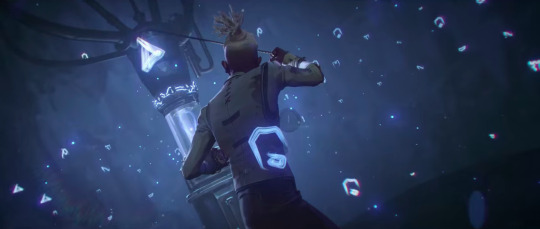
A thing I really like about Arcane S2 that I haven't seen discussed much is the way time itself breaks down over the course of the season. The linear structure of the narrative splinters and fractures as the story jumps through flashbacks and flash-forwards and increasingly intercuts scenes that take place over different amounts of time. I know there were people who found the timeline of S2 confusing, but I love it, and I do think it was an intentional choice to break the linear structure of the story up this way. It's very fitting for a season that introduces time travel, multiverses and temporal paradoxes and runs on an underlying thread of chaos and unpredictability.
It should be said that from the beginning, Arcane has done a lot of messing with time in subtle ways. The end of 1.03 is a good early example. It seems like only minutes pass between the flash of arcane light that alerts the Enforcers to what Jayce and Viktor are up to, and the moment they break down the door to Heimerdinger's lab. Meanwhile Vi, Claggor and Miles cross a good portion of Zaun to sneak into the cannery looking for Vander. It doesn't matter that the time scales don't really match up or even whether the events in the two storylines are really happening at the exact same time. It's the dramatic effect of the intercutting that draws us in. And there are many small example of expanding and collapsing time, from montages that cover months to the blast from Powder's hex crystal bomb being repeated over and over so we can absorb just how much destruction it causes. Of course none of these techniques are unique to the show but it is a strong stylistic choice they made right from the beginning.
But from around 2.05 onward shit gets truly wild. We smash cut out of the climactic moment of a huge action sequence for an understated, melancholy flashback to young Vander, Silco and Felicia. Many episodes in the show are framed by flashbacks to highlight the theme or dramatic question of the episode, but the transition is particularly sharp here.
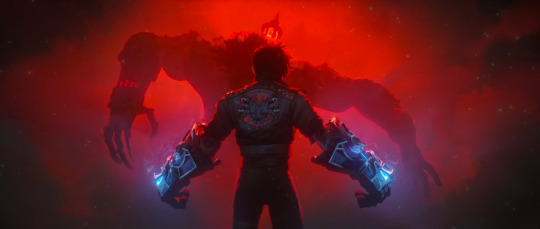
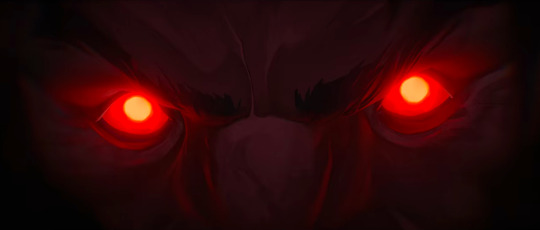
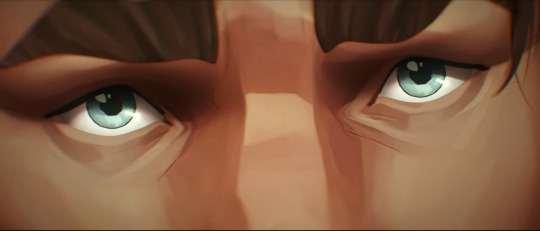
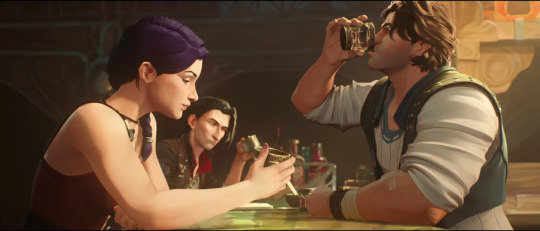
We see Jayce come back from the hell dimension at the end of 2.05, but chronologically I think this actually happens in the middle of 2.06. 2.06 takes place over at least two days and a night, but possibly many days as Viktor tries to heal Vander. (Did he somewhere in this multi-day process realize how much his power was waning and send Salo to steal the hexgems for a power boost?) Jayce seems to go straight to the commune once he gets back to his timeline--he doesn't even stop to shower or change clothes. So I think this:
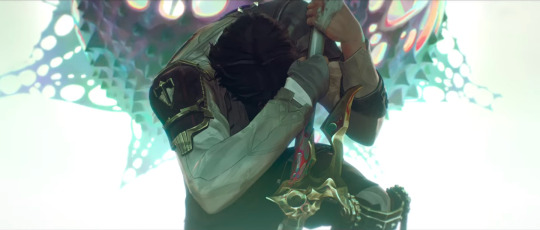
and this:
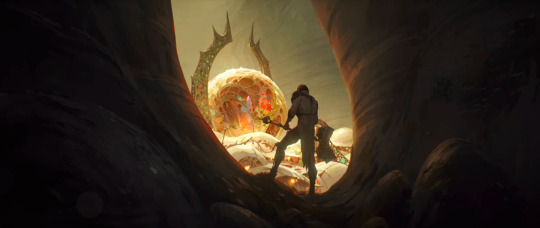
could conceivably be the same day. But at the beginning of 2.06 we have actually jumped back in time by at least a day, maybe several days, to pick up the storyline when Vi, Jinx and Vander first arrive at the commune.
2.06 is full of things we have no context for the first time through because we haven't seen them yet. It opens with a flash-forward to images from the end of the episode that we have no way to interpret:
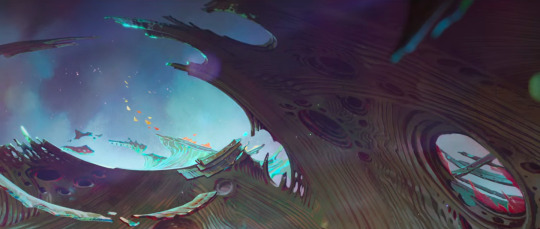
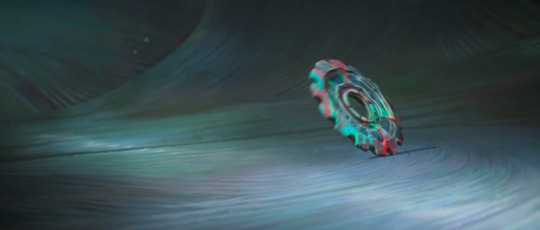
The whole time he's staggering through the commune, Jayce is having flashbacks/hallucinations overlaying the decaying puppets from the ruined timeline over Viktor's present-day followers:
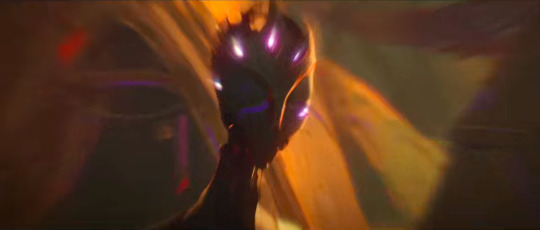
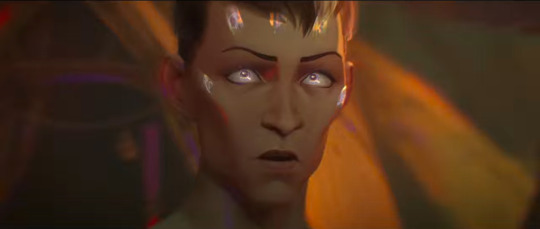
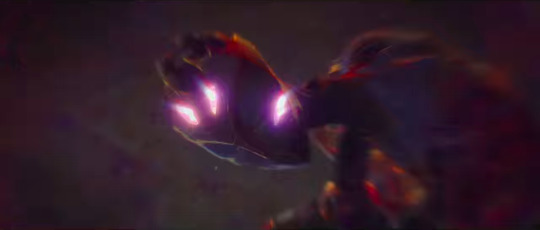
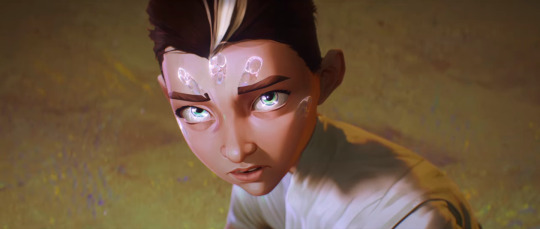
Except we have no way to know what they are the first time through this episode because we haven't seen those puppets yet.
The biggest time distortion of course is that everything in 2.07 actually happens somewhere between 2.03 and 2.06 in the main timeline. But even saying that doesn't really capture the temporal weirdness because everyone who gets sucked into the anomaly spends different amounts of time in their alternate timelines. Heimerdinger spends three years in the happy AU timeline; Ekko seems to be there for a matter of days, but also arrives back in the main timeline later than Jayce. Jayce spends at minimum weeks and maybe months in the pit, based on how long it would take a break like that to heal enough to walk on even with support. Meanwhile I think it's reasonable to guess that something like 6-8 months, but possibly as much as a year, pass in the main timeline. Jayce gets a bit scruffy and in the same amount of narrative time Viktor grows his hair out almost to his shoulders, and maybe he doesn't work quite like a normal human anymore but we don't have a lot of other markers to measure time by. Meanwhile, Mel spends idek how long in mage purgatory, and then making her way back to Piltover.
By the time we get to 2.08, events are happening completely out of order. We start with Mel what might be weeks before the point in the timeline where Jayce shoots Viktor, then we jump forward to the aftermath of the battle in the commune, then we jump back but only by a few hours to pick up Vi, Jinx, Cait and Jayce fleeing the battle, then forward to Vi waking up injured in Cait's bed. We have the council chamber fight and we hear Viktor say, "Doctor, you may begin the process" but we don't see what that means until the end of the episode. The amount of time Vi spends locked in the cell before Cait finds her (which can't be very long, since Cait seemed to know where to look for her) does not at all seem to match up to the time span of the scenes it's surrounded by of the city preparing for war. Mel confronts Ambessa at night and sees the aftermath of Viktor evolving his followers first, then we flash back to (probably) that afternoon and the moment of transformation, all so we can end with the dramatic punch of The Line.
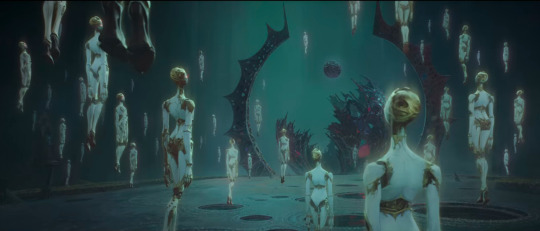
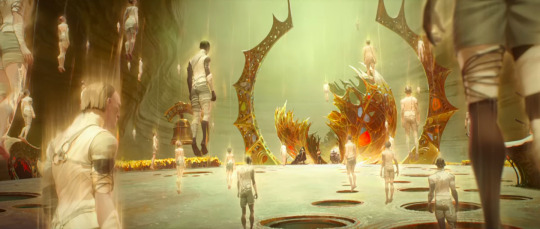
The point of writing all this out is to show how disordered the timeline gets as things spin out of control before the big finale. 2.08 in particular is also a spectacular example of very confidently ignoring linear storytelling in favor of arranging the emotional arc of the episode to pack the biggest punch.
2.09 is actually fairly linear in comparison, because it's mostly action, despite having actual in-world reversals of time in it. And of course there is Jayce and Viktor's culminating scene, which for all we know might only be a fraction of a second long in real time.
S2 is structured in a way that you have to watch it at least twice--you simply don't have all the information about why certain things are happening before you get to the final reveal. I'm someone who loves nonlinear storytelling, so I found this to be a delight, and I love teasing out the pieces of how the timeline fits together, even if it takes several watch-throughs to catch certain details. But regardless of whether you found it enjoyable or frustrating, I think it very much fits with the overall motifs, tone and style of S2.
48 notes
·
View notes
Note
High its been a while im always wondering how people will handle bloom's and sky's relationship especially on sky's side so i wanted to know how your gonna do it
Hi again Seth @seth-the-whalelord!! Thank you for being interested :)c
Big blab ahead:
Sky is so hard for me because im trying not to let the residual haterism from my childhood keep me from writing him a good arc. There’s not a lack of criticism for him in the fandom so I won’t beat a dead horse. Honestly the bones of the story are there - he fucks up plenty, and he causes some good conflict and story drama, I honestly think the story just needs to follow through.
A lot gets fixed by just……..working on Bloom and Sky being friends? In general I have beef with how aggressively paired off everyone in the winx/specialist groups are and I think its a bit ridiculous how it seems at times like they don’t have friendships with each other outside their significant others. With a cast as huge as Winx has, communicating a group dynamic is SO important to combat it feeling bloated.
I think a big Sky problem to me is, he does some things that we see are short sighted/ hurtful to Bloom, but its like…I feel like when he’s not doing something that we (fandom) is booing at him for he’s also not doing anything that interesting? When Riven does something that sucks the story makes sure you know it, everyone says it sucks, the narrative knows it sucks. But he’s arguably the Specialist who has the biggest story beats, and that’s memorable. I think it really does not help Sky in any of our memories that the main things he does in early seasons are when he ditches bloom when he sees the fake prophecy from the trix, and that he dated her while neglecting to say anything about his arranged marriage, and that it doesn’t REALLY feel like he made any changes or did any growth about these things.
So a lot of what Bloom and Sky have going on for me are[loose vibe outline]: they mutually crush on each other early on, but they don’t really know each other. I like to imagine they’re both the bantery-y type so they have a lot of fast paced clever exchanges. They have the idea of someone, and of course that isn’t a stable thing to have a relationship based on - they wind up hurting each other because that’s what happens when you date the idea of someone in your head. They would spend MOST of the story not actually together, but they’re very important for each others arcs
My Bloom had a much more defined misfit weirdo vibe growing up, so some of what she deals with in gaining this group of friends is these underlying trust issues she has. She very much is ‘hot and cold’ - goes from being impulsively smitten with Sky before she knows him that well to thinking the worst of him once she thinks that he’s purposefully fucking with her feelings.
Meanwhile Sky really wants to be seen as Normal and likes Bloom because he sees her as a down to earth girl. However he needs to actually look at himself and realize that the way he was raised and the privileges he has /do/ affect his perspectives and how he acts, and he has to own up to that. a lot of the time because hot-headed Bloom will call him out on it. And being okay with the fact that the charming ‘normal’ girl he likes actually has a lot going on that takes priority over him!!
Sky starts out defensive but comes to really value the person Bloom pushes him to be. He likes her because of her fiery passion and ability to stand up for what she believes, something Sky would be envious of. Meanwhile Bloom, ever the escapist, learns she'd rather know him, a guy who has worked hard to gain humility and be a better person, and a friend who will stand by her even at her worst, than just the rakish knight in shining armor she took him for. I have this idea of doing something with the relationships where im not defining every endgame ship… my goal is that Sky is definitely written as one of Blooms primary potential romantic interests, and they have chemistry and growth together such that you can easily imagine them together by the end of the series/story, but I’m not actually making anything set in stone official.. so u know ppl can do what they want….
#winx#winx club#winx bloom#winx sky#winx rewrite#i actually dont know what the ship tag is??#asks#seth-the-whalelord
21 notes
·
View notes
Text

An argument for the veil remaining intact
From someone who really wanted veilfall.
Please: If you know this will upset you, do not read. Do not harass or attack me about this. Take care of yourselves and be kind to other people - like me! - by not subjecting yourself to things that will anger/upset you. This will also draw from current, real life things; I don't go into detail, but if you don't want to read that, this is your Please Scroll Past warning.
In an twist from my norm, this is going to contain both watsonian and doylist perspectives.
For those who may be unfamiliar or get them confused: in reference to the Sherlock Holmes books, a watsonian view is that any mistakes made in the text are because Watson made an error while recording Holmes' endeavors. Thus, a watsonian view is one that exists within the narrative framework rather than outside it. A doylist view is that these are Sir Arthur Conan Doyle's mistakes instead, thus looking at the narrative from an outside view.
From a purely watsonian perspective, I think veilfall would have been narratively satisfying and I certainly understand why so many people wanted it and are disappointed that it did not happen. That's super fair! As I said, I wanted it, too. But I also think that the in-text explanation for why it's not a good idea is a genuinely valid one and did a fair bit of work in convincing me.
But in this case, I find the doylist view to be a lot more relevant.
The world - our world, the real world - is in a time of major strife. With the rise of fascism, with the increasingly explicit hatred of queer people, with the sustained hatred of POC and disabled people (including neurodivergent people), with misogyny and classism and everything that's going on...
A queer dev team made a game where the underlying statement is that you cannot save through destruction. And this is relevant. It is incredibly relevant. It is powerful, profound, and important as a message. There is no single violent revolution that will fix the world and give us a utopia.
There are so many people who are waiting for the revolution. Who want a violent disruption. Who fantasize about living in the ruins of society. I'm not saying this is horrible or anything, it makes sense why these fantasies exist, but they obscure the necessity for the grueling work that is truly necessary.
I'm not saying there is no place for revolution. There absolutely is! I'm also not condemning the use of violence wholesale - there are times when people have no other recourse, I understand that. But I'm an American and I'm mostly talking about my fellow Americans at this moment in history because that's the context I know best and it would be the height of hubris to presume to know enough of every single culture and the entire world to speak for everyone.
There's this fantasy about waiting for the revolution and then we'll rise, then we'll fix the broken system, then everything will happen... and the actual impact of this fantasy is that people can abandon the movement in anticipation of the revolution.
In the end, Solas does not tear down the veil, killing thousands in an act of profound restoration. Instead he binds himself to his mistake and turns to his first victims, those who are still alive, and commits himself to easing their pain and the pain they bring into the world.
This narrative is so timely and so relevant. It has a message. It has many messages.
The need for compassion even in the face of disagreement (again, please note I am saying compassion not tolerance not rolling over and letting your oppressors walk all over you - but it's a known thing that compassion for others - even those you dislike or disagree with - is a functional tool in the arsenal of sociocultural improvement).
That there is no point at which a person cannot change their mind and take a new path. Regardless of how committed they are to a singular outcome, they can always change, and that such change is usually created through the use of compassion and sympathy. Solas can bind himself to the veil. So many people he cares about have spoken to him about this, counseled him about this. And in the end, he can accept their advice and change.
Solas is not an evil villain, and veilfall is not meant to be cruel. But it's an important message that destruction is not restoration, even when that destruction will bring about a certain kind of restoration. That there are paths forward, meaningful paths forward, that do not rely on violence as a tool. That do not utilize destruction.
All media is a reflection of the time it is created in, and DAVG is no exception. And in this time, I find the veil staying intact to be important, especially when coupled with Solas' plans to ease the Titan's pain. I think it'd fall a lot flatter without that, if he just said "okay, you're right" and bound himself to the veil and then just did his own thing. That'd be giving up. But he's not giving up at all - no one had to suggest that he heal the Titans, he immediately turned to that on his own.
Bloody, ravaged, dealing with this immense cathartic grief, and he still decides he's going to do this. He will make a different path for himself. He will find another way - a harder way - to make things right.
This isn't a criticism of those who are disappointed by the lack of veilfall. Everyone is going to interact with media in different ways, particularly when expectations have been building up for so long. I thought that the veil remaining intact would be immensely disappointing to me, perhaps even ruin the game, and I was surprised when it didn't feel that way. And I've been giving it a lot of thought ever since, and this is where I landed.
18 notes
·
View notes
Note
Just noticed crunchy roll changed the synopsis of the show to reflect the show a bit better instead of just "School, beacon,magic 🤪" which does nothing to describe the plot without spoiling anything now its "In a world filled with horrific monsters bent on death & destruction, humanity’s hope lies with powerful Huntsmen and Huntresses. Ruby Rose, Weiss Schnee, Blake Belladonna and Yang Xiao Long are four such Huntresses whose journeys will take them far past the grounds of their school, Beacon Academy. Though each may be powerful on their own, these four girls must overcome dark forces and work as a team if they truly hope to become the next generation of Remnant’s protectors."
Which I think is a bit better honestly
yeah honestly like
people got way too hung up on the school aspect when that's never what the show was actually about (i made a post the other day about how we only see about three classes throughout the entirety of the first three volumes and aside from a few school-mandated activities the most relevance Beacon has to the plot is that the team sleep there); fixating on the school aspect really misses the point that it's about the world and the characters
it's not, and never presented itself as, a slice of life school show set in a fantasy world - the academic side of things rarely if ever comes into play because it's ultimately less important than the heroes coming into their own and getting involved with the underlying mysteries of the world they live in
i've said before a few times that RWBY is structured more like a JRPG, and draws a lot of influence from Final Fantasy VIII
saying 'RWBY should have never left Beacon' is like saying 'FFVIII should've solely been set in Balamb Garden', like i cannot begin to tell you how goddamn boring a 40 hour fantasy RPG set entirely in and around one location would be
i think a lot of the time people who want that out of RWBY just aren't watching the shows they want to watch (which would be... nickelodeon or disney channel highschool sitcoms, apparently) - like, is anyone asking why they want to watch multiple seasons of the same characters attending class and eating lunch together, over a dynamic story that takes the characters through various locations as part of an unfolding narrative?
32 notes
·
View notes
Note
would you be down to give me a rough outline of how Prowl has been characterized over the publication history of the tf comics? I mean, in as far as you know about it. Every time you mention the costa stuff it makes me curious
I can try! I can't really drill down well without a thing to focus on specifically, but here are some general highlights.
Furman (and stuff that directly draws from Furman's run, like AHM as a whole) characterizes him basically as he did when writing Marvel G1, and gives him so little to do that not very much really comes out even then. Uptight, stick-in-his-ass, still a basically Good Guy TM and while he puts people's backs up a little, he's not under any level of suspicion. This is the closest to continuity-agnostic "fanon Prowl" you get in IDW, because that fanon figure draws quite a lot on the Marvel G1 characterization (when it isn't simply making things up wholesale, anyway). Furman copies his own homework, basically, lmao.
Roche is the guy who wrote phase two Prowl into existence as we know him. Rather infamously because he thought it was an interesting take on the character to er, ignore all the above stuff and make the Autobot SIC a rat bastard, lmao. Roche and Barber's interpretations came to dominate the character in IDW going forward, but they do differ. Roche's Prowl is more isolated from other characters (one does not really imagine Wreckers Prowl calling Bumblebee his best friend sincerely, as exRiD Prowl does), and people treat him as disliked by default. Even before the worst of what he does comes out, his reputation precedes him. Also, Roche's Prowl speaks fairly neutrally, whereas exRiD Prowl speaks more casually than fandom tends to admit to! Finally, Roche's Prowl is less spontaneously, outwardly emotional than Barber's is later on, and tends to fit the fanon stereotype of "always restrained" more.
Costa came in post-AHM but pre-Wreckers and hated all that, so he retconned it. LMAO. His Prowl is the archetype of the "good cop" protagonist surrounded by corruption, combined with surface level noir tropes that sort of work in tandem with those but lacking any grit. (Costa seems to understand what noir looks and sounds like, but none of the underlying narrative devices that make it function as noir.) This Prowl is specifically supposed to be (here's the retcon) someone who used to be more deliberately cold, removed and logical but who has specifically decided to change to be different following his experiences on Earth. (Spotlight: Prowl is a good one-issue explanation of Costa's perspective on Prowl, which is not the same as being a good comic.) As time goes on, the sheer unpopularity of this take pushed Costa to undo it a bit, and reintroduce some level of ambivalence to him... but by and large he remains kind of the "good authority figure who objects when the systems are misused" type, almost? His conflict with Spike is very much over the fact he expected better of Spike, see.
Barber's Prowl notably does not wholly throw the Costa stuff out the window. (This is why the Spike stuff features a lot; it's really the only strong emotional hook Costa's work gives you for his version of the character to grab at.) But Prowl is back to being a morally gray figure whose moral ambivalence is very strongly tied to his role as an authority figure- and that's worth mentioning. Prowl's downward spiral being intrinsically linked to his refusal to relinquish authority, and his abuse of it, is something that is all Barber and not Roche. (In Wreckers, Prowl is an asshole because of personal arrogance. In exRiD, he's more an asshole because of his role enabling a wider system, by the end. IMO that's a big difference, anyway.) He is not starting off exRiD loathed by absolutely everyone, or a figure of preexisting serious mistrust. That's something that develops over the course of the comic as things come to light for the characters in-universe, meaning exRiD Prowl feels like he's put up a more convincing shield in front of his worse dealings over the course of the war, perhaps. His position deteriorates significantly over the comic. He is more prone to balancing his deliberate cold-heartedness with angry or emotional outbursts than we saw in Wreckers, leading to him having multiple outbursts that worsen his situation over the course of the comic. This is the Prowl who holds grudges.
Roberts' Prowl is kind of different to talk about to the above because his Prowl in Shadowplay and his Prowl in Titans Return are different genres. I can do a post on that if folks really want but it probably is its own post, haha.
IDK feel free to clarify any specific stuff you'd like a vibe on if you want, this is all just what came to my mind instinctively!
#idw*2 is a mess and i would need to reread to criticise it properly.#dw is just Marvel Again but with the inexplicable stranglehold praxus has on fanon forever added
122 notes
·
View notes
Text
thoughts on HOTD, episode 4, season 2 (spoilers below)
enjoying the continued focus on daemon's dream states. i like that the show is not afraid to focus on the underlying darkness of the daemon/rhaenyra relationship, and that it even names his actions as predatory. not because i need the show to moralize to me about it, but because it makes daemon a more nuanced character for him to have subconscious guilt and self-loathing over his relationship- he realizes he did take advantage of rhaenyra's naivety and idolization of him, and while he doesn't regret it, he does fear that part of him loved rhaenyra *the most* when she was young and easily idealized as the charming, impulsive princess, not a wife and mother with real world worries and mistrust of his intentions.
aemond stunting on aegon by flaunting that cole trusts him more, and that he has superior knowledge of valyrian- thus implying he is the more 'fit' heir, was pretty well done. that said, i think the rook's rest plan is dumb in canon and dumb here. hoping to corner rhaenys (or any dragon rider) specifically at a castle surrounded by open air and the sea just seems silly. i acknowledge that the writers could likely only change the circumstances of the ambush so much, it just irks me.
all the harrenhal scenes in this episode are fantastic. the sheer atmosphere and the spectacular set design go a long way to contributing to the gothic thrills. i wish the show could always be this openly fantastical. and gayle rankin's alys is excellent- i love her slightly nasal accent, her kirtle, her long hair- just everything about her. an actress with less charisma could not sell her blatant manipulative attitude or the snippets of dry humor. i'm excited to see her and aemond in a scene together.
i'm curious to see how long alicent's apathy and nihilism lasts. a lot of people have compared her to GoT's cersei in this episode, and i can see it, although i don't think cersei was ever quite so blasé about her son's reign. i suspect we may see her 'snap out of it' when she is confronted with the extent of aegon's wounds, though i hope she doesn't revert straight back to self loathing and blaming herself for it.
jace's reaction to rhaenyra's return is essentially that of an exasperated father confronting his teenaged daughter after she returns from a party at 2 am. i do think it is silly that rhaenyra confesses to her council that she made a last ditch effort for peace- it makes her look impulsive and naive in front of them. i think the writers are attempting to show that yes, it was foolhardy and that jace is right to be horrified, but i did laugh out loud when rhaenyra admits that she, just now, has decided to fully commit to the war.
the show's reliance on the prophecy of ice and fire is stupid- but i do like the idea of House Targaryen having a narrative they constantly reinforce to themselves whenever they need a justification for their actions. i'm not railing against rhaenyra using this as an excuse at this point- i just wish the show leaned less on this 'chosen one' narrative.
the scene of Vhagar lurking in the woods was some fantastic framing- very Jurassic Park, and the initial entry of Vhagar into the dragon duel is very well done. the entire fight scene, i thought, was fantastically choreographed- it truly was like a dance between first Meleys and Sunfyre, then Meleys and Vhagar. a lot of people were furious that the show depicts Aemond deliberately waiting to enter the battle when he realizes Aegon has shown up unexpectedly, and then having Aemond choose to attack while Meleys and Sunfyre are interlocked- but Aemond attacking without concern for Sunfyre and Aegon is what happened in Fire & Blood.
additionally, while some people have claimed that Rhaenys had 'ample time to flee' from the battle, the scene makes it clear that Meleys was badly injured, even before Vhagar gets her jaws around Meleys' neck. Rhaenys was either going to be hunted down and caught by Vhagar, or turn back and go out fighting, and that's what she chose to do.
overall, i'd say this episode was a solid 8.5/10. the last 20 minutes were amazing, especially the evocative 'dance' of the battle, and the harrenhal scenes were great as well.
15 notes
·
View notes
Text
On Queerbaiting
This isn't a post about deciding whether 911 is queerbaiting, but it is a post about defining what queerbaiting even means, because I've seen (and used) multiple definitions, and I think it's helpful to point that out.
First of all, there is no formal definition of queerbaiting. It's a theoretical/fandom term, and those evolve over time, as different people adopt them, and as history and contexts change. As much as I would love to gatekeep the word "queerbait" from everyone that I personally find annoying, I have to live with the fact that I can't, because it's a living concept.
Who cares if a particular show doesn't fit the textbook definition, because there is no textbook definition! Clarke and Lexa were both WLW in a relationship and half the queerbaiting scholarship still uses The 100 as a central example in their academic articles so like! The rules are made up!!!
(And honestly that's part of why I've always hated this term, because it kind of means nothing and everything. Like I've always thought it did a lot of emotional work without doing a lot of helpful interpretive work, as evidenced by the fact that every time someone uses it, someone else tells them they're using it incorrectly. ANYWAY.)
Below the cut is where I try to define "queerbaiting" after just saying it can't be done (rip):
Like most things in fandom, "queerbaiting" describes an interaction between creator, text, context, and audience (aka fans). The different definitions come primarily when when we put different emphasis and significance on each of these categories:
Should queerbaiting be about the betrayal fans feel, regardless of the creator's desire to trick us or not? Should it be about the creator's underlying goals (as in "courting a queer audience with no intention of following through")? Should it be about the text itself and what the characters say about their relationship and sexualities on screen? Should it be about the way the show is discussed and advertised in the media?
I think most people think it's some combination of all of the above, which makes it subjective and super hard to pin down, especially when we bring the intentions of others (like showrunners) into it. But is also what makes it interesting to think about. I would argue that the feeling of "baiting" comes about when one or more "legs" of this table is different from the rest, creating a wobbly contradiction that fans need to try to reconcile.
Eve Ng coins a great term in a scholarly article about queerbaiting: queer contextuality, defined as "how both the current and previous landscapes of LGBT media narratives inform evaluations of particular texts." Ng argues:
The crucial element [in defining something as 'queerbaiting'] is not a lack of canonicity, but how satisfactorily queerness plays out in the canonical text relative to viewer expectations that emerge from the reading of multiple texts and paratexts and that take account of queer contextuality.
In other words, Ng argues that "queerbaiting" is less a static "yes or no" category that exists in isolation, and more an ongoing interaction between viewers, text, paratext (meaning "texts that surround a main text," like ads and interviews), and historical context, including our beliefs about what forms of queerness are possible on TV at a particular historical moment, which is inherently informed by our prior media experiences (positive and negative).
So taking the term "queerbaiting" out of it for a second, and shifting away from rigid definitions about whether it still "counts as queerbaiting" if...
To me the feeling of being "baited" suggests there's been a disconnect or rupture somewhere in the interaction between text, creator, paratexts, and audience -- and "queerbaiting" is when that rupture takes on particular resonance for queer viewers, in the context of other queer representations that have come before.
I think a lot of people have been describing that rupture in various ways over the last couple days -- whether they call it queerbaiting or not -- and I think that's useful work. Here are some questions I've seen people considering and offering varying answers to:
What are we feeling as fans, and why? How might that be similar or different to the ways that segments of the audience are feeling?
Do we feel like this ship is represented textually differently than a straight ship would be? If it's not being treated differently than other "will they/won't they" straight ships (for example), does the fact that it's queer inherently change the way those narrative choices are understood by the audience?
Do we feel like there's a disconnect between the types of queer stories that are possible to be told here (not just desired by us, but feasible), and what we've been given on screen?
Do we feel like there's a disconnect between the text and its paratexts? Where and why?
Do we feel like there's a disconnect between the goals of different "creators" -- actor, showrunner, network -- and to what extent is that contributing to the incoherence or sense of rupture?
Where do reviews/interviews/media outlets sit here? To what extent do we believe that media critics acting on their own, and to what extent does the paratextual content suggest a larger PR push by ABC?
Do we feel like this relationship will be represented on screen in the future, or do we feel that it's unlikely to ever be made canon? To what extent does that impact our feelings of being tricked, used, manipulated, etc? And again, how does the fact that this is a queer relationship impact our own expectations and needs here?
The way we answer each of these questions reveals a lot about what we each feel we need when it comes to the telling of queer stories on TV, our own position/agency as fans, and where American TV (and the larger media landscape around queer storytelling) may still be failing us. So let's keep asking them.
#911#buddie#did i write a whole essay just to land on 'it depends so everyone should do what they want forever?'#no comment#also i have my own opinions about whether i would call 911 queerbaiting at this point or not#(i probably would not)#but i also agree with most people's posts who HAVE called it that#which i think is what motivated this post#the term started to feel less and less useful for me personally the longer i thought about what i was feeling and why#like when you just say a word over and over until it loses meaning#so this was me trying to re-infuse it with a meaning that i found helpful#plus it was a good excuse to cite that Ng article which i really like#maybe nobody else will agree which is also fine!!!#like i said:#do what you want forever!!!!
4 notes
·
View notes
Note
I just read your post about the motogp community and I wanted to ask: what are the things that interests you more about the sport?
oof that's a big question... got hooked on the racing itself, stuck around for the fraught interpersonal relationships. I got into the sport in a slightly odd, roundabout way, but it was something fun and new and just 'for me' (again, not a mainstream sport around here) at a time when I was going through a major life change. a lot of what I enjoy about watching sports is the research that goes into fully understanding what I'm watching. motogp is slightly odd in that regard (as I suppose are motorsports I got into more recently in similar fashion), because my technical understanding of the sport will always remain fairly limited. plus, you just understand a sport differently if you've had the chance to compete in it yourself, and obviously I have never raced on a motorbike before. so, for the sport I grew up with that I play myself and have a coaching license for, when I watch a lot of my thoughts and notes concern quite precise details about techniques and tactics and all that stuff. in concrete terms, that is a sport I feel like I could be a commentator for with a little practise... but with motogp, I couldn't do that. it's always going to be a sport I consider myself an outsider to
which does make a difference to me! of course, there's also something fun to that... it's all a bit more new and exciting and less personal. I don't really mind as much if motogp ends up developing in ways I don't approve with, because it's not a sport I feel like is mine to lose. motogp doesn't quite have the capacity to hurt me in that way. I'm just passing through, taking what I can get, and I also accept there are a lot of people out there who understand a hell of a lot more than I do. I have to take experts and the riders themselves at their word more than I would for a sport where... not to sound arrogant, but I kinda believe I know more than a lot of the equivalent people there. but, the thing is, motogp has clearly been able to sustain my interest because it's given me so much that I enjoy researching - and here a lot of it isn't necessarily super technical (though obviously I always want to understand more about those aspects). at the end of the day, motogp provides a lot of the kind of drama I'd kill for in other sports. all of the aliens are absolute gifts in this regard... it's like you're being slapped in the face with one banger of a rivalry after the other, the kind of thing you really really need to dig for in other sports. it's the difference between me having to scrape together an athlete's 2003 blog posts on defunct websites to figure out how she's publicly managing perception of the rivalry with her erstwhile friend and... okay, I mean, essentially I do the same thing in motogp, but there's also the more recent stuff to enjoy. not all other sports can claim the same is all I'll say. plus it's just so bonkers like genuinely where else do you get this sort of thing
for me, sports is all about narrative, and narrative is all about conflict. the joy is in figuring out how the competition makes athletes express themselves - it's a sort of language, in a way, where competing is a kind of constant back-and-forth that's informed by the image of the self and the image of the other and the image of the other's image of the self and so on. it's something I'm a lot lot lot worse at interpreting in motogp... at the end of the day, when I'm talking about riding styles or ways of winning races or mind games or whatever, I'm essentially poking in the dark. I don't know what I'm talking about. which also impacts the level of psychological insight you can get, because having a detailed technical understanding makes it way easier to understand the mental calculus that underlies each action an athlete is taking. but! motogp gives me so much to work with because all the drama is so insane and over the top... it might be poking in the dark - but also they're constantly setting things on fire! so there's plenty that even the layperson can see. it means I follow motogp a bit more for the actual athletes themselves than I do in other sports, though I think it's still quite balanced
but yeah, for me following motogp is primarily about a) watching races and understand as well as possible what I'm watching, and b) going down research rabbit holes, which hopefully also helps (a). with anything I'm a fan of, I'm fairly wary of how I interact with fan spaces. which in motogp terms means there's a lot of things I am extremely disinterested in arguing about, especially if it's stuff I was already sick of seeing seven years ago. I enjoy my fair share of sports discourse, but I find goat debates quite possibly the most tedious thing in the universe in any sport. I love numbers, I have many many spreadsheets dedicated to sports stats for some of the most obscure shit under this sun, but if it's just a dick measuring contest over comparing athletes' achievements, then again, goot bye. mainly I just want to have fun and I'm not going to interact with this sport in a way that doesn't spark joy... I already have a sport I'll never escape from, one is quite enough for anyone. if there comes the point where a specific fan space or even the sport as a whole is no longer fun, I'm out
#flirting with omphaloskepsis here#motogp will never be my primary sport for the very simple reason that it doesn't have women competing at the highest level#and look I don't follow women's sport as a political act - I follow it because I enjoy it. but it's still a line in the sand#anyway lack of knowability is as maddening as it is fun... I always feel like I'm *missing* so much when I'm seeing on-track battles#because I just KNOW how intricate the equivalent would be in my sport and you just have to assume there's so much you're blind to#anitalianfrie#//#batsplat responds#also it's not like I've always followed motogp with the same intensity. especially the past few years...#that marc indonesia crash in 2022 was a moment where I was kinda like. yeah this isn't really much fun for me right now#when valentino/maverick were almost killed at austria 2020 I thought more seriously about whether I really wanted to watch -#- a sport where I could watch someone die in real time. it's still a sport that makes me uncomfortable in a lot of ways. and yet here I am
11 notes
·
View notes
Text
Blog post #6
How does the media shape the way people think about technology?
Media plays a huge part in shaping the public opinion. When discussing technology, media can often present it in a negative or a positive light. For example, In this class, we talk about how technology can usually have underlying issues such as racism, sexism, trolling, etc. Also, as I said the media shapes cultural narratives so whatever is trendy at that point in time is gonna be the main opinion for most people. So, the media has a very huge part in the opinions of the public.
What challenges do social media platforms face when moderating hate speech?
There are many challenges that social media platforms face when trying to moderate hate speech. The biggest issue would be that a person could just make another account and continue the cycle, but there’s also an argument that once there is moderation on a platform nothing will be allowed and that free speech will be limited. Another challenge is figuring out the context of the post, in some countries, certain words can mean good things whereas in other countries those words are the worst words you can say. It is a tricky issue to tackle but I hope there can be less hate speech without limiting free speech.
How has social media changed social justice movements?
Social media has played a huge part in social justice movements, a great example is the BLM movement and how it took over platforms like Twitter and TikTok. In 2020 every TikTok post was some sort of injustice someone had faced and their experience. Also, the speaker on Wednesday mentioned how women in Mexico who face injustice use social media platforms because a lot of the time the police and government are corrupted and do not take them seriously. Without social media who knows if those women would have gotten justice for the things that were done to them. This shows how social media can be used for good and not only trolling and hate.
What is the concept of interpellation?
The concept of interpellation, according to Google, explains how ideas get into our heads and affect our lives, so much so that cultural ideas have such a hold on us that we believe they are our own. According to the reading, Race & Social Media by Senft and Noble, it states, “The Marxist psychoanalyst Louis Althusser developed a concept called interpellation that is useful when trying to understand the mechanics of racialization. According to Althusser (1971), we derive our sense of identity from how we respond to the ways in which others implicitly categorize us through public speech and gestures each day”. This shows how the public is heavily influenced by the media.
Benjamin, R. (2019). Race After Technology: Abolitionist Tools for the New Jim Code.
Hungsinger, J., & Senft, T. (2014). The Social Media Handbook
Daniels, J. (2009). Combating Global White Supremacy in the Digital Era.
5 notes
·
View notes
Text
Remember: “Mental Illnesses/Disorders” Do Not Exist in the way we’ve been told. They are social constructs NOT biological illnesses/disorders like asthma, cancer, and the flu. Mental and emotional distress DO exist, and that’s what we should be focusing on addressing!
"Despite decades of intensive research, there is still no conclusive evidence that enables any of the major categories of mental disorder, including schizophrenia, depression,anxiety and attention-deficit hyperactivity disorder (ADHD), to be considered a neurological condition in this way. The fact that there are some subtle group differences between people with some diagnoses and ‘normal controls’ in aspects of brain structure orfunction does not demonstrate the presence of a neurological disease. None of the findings are sufficiently specific or capable of differentiating between a person who is thought to have a particular mental disorder and one who is not.
Diagnosis is still made on the basis of behaviour, thoughts and feelings that are reported by the individual or those around them and that depend, of course, on judgements about what is ‘normal’ and what is not." (source: Critical Psychiatry: a brief overview)
"Psychiatrists fail to appreciate the enormous impact for patients of being told that depression is caused by a chemical problem in the brain and that antidepressants can fix this problem. Skating over this issue to turn to alternative hypotheses about the cause of depression or the mechanism of action of antidepressants neglects to address the fact that patients have been misled. It is alarming to hear that there is a problem in your brain and it is misleading to suggest that we know there are drugs which can fix it.
This narrative strongly encourages people to take antidepressants because it seems wholly rational to take a drug which reverses an underlying chemical problem; indeed, it seems irresponsible not to do so. What is being dismissed as trivial semantics by experts has had consequences for the life choices and self-perception of hundreds of millions of patients worldwide. Imagine being told that you had a major problem in your heart that required medication to fix—only to find out that that problem was not truly there.
For the public, the chemical imbalance has been no straw man or semantic approximation, but something that has guided the direction of their lives, choices, and health. We know that believing that your depression is caused by a chemical imbalance tends to make people more pessimistic about recovery (seeing their symptoms as more chronic and intractable), leads them to believe they have less ability to regulate their moods, and also leads them to believe that medication is a more credible solution than therapy.
We should actively counter this myth and remove it from medical information conveyed to patients because it is not supported by evidence." (source: Mad In America)
"Horgan: When I criticize psychiatric drugs, people sometimes tell me that meds saved their lives. You must get this reaction a lot. How do you respond?
Whitaker: I do hear that, and when I do, I reply, “Great! I am so glad to know that the medications have worked for you!” But of course I also hear from many people who say that the drugs ruined their lives.
I do think that the individual’s experience of psychiatric medication, whether good or bad, should be honored as worthy and “valid.” They are witnesses to their own lives, and we should incorporate those voices into our societal thinking about the merits of psychiatric drugs.
However, for the longest time, we’ve heard mostly about the “good” outcomes in the mainstream media, while those with “bad” outcomes were resigned to telling their stories on internet forums. What Mad in America has sought to do, in its efforts to serve as a forum for rethinking psychiatry, is provide an outlet for this latter group, so their voices can be heard too.
The personal accounts, of course, do not change the bottom-line “evidence” that shows up in outcome studies of larger groups of patients. Unfortunately, that tells of medications that, on the whole, do more harm than good.
As a case in point, in regard to this “saving lives” theme, this benefit does not show up in public health data. The “standard mortality rate” for those with serious mental disorders, compared to the general public, has notably increased in the last 40 years.
Horgan: Do you see any promising trends in psychiatry?
Whitaker: Yes, definitely.
You have the spread of Hearing Voices networks, which are composed of people who hear voices and offer support for learning to live with voices as opposed to squashing them, which is what the drugs are supposed to do. These networks are up and running in the U.S., and in many countries worldwide.
You have Open Dialogue approaches, which were pioneered in northern Finland and proved successful there, being adopted in the United States and many European countries (and beyond.) This practice puts much less emphasis on treatment with antipsychotics, and much greater emphasis on helping people re-integrate into family and community.
You have many alternative programs springing up, even at the governmental level. Norway, for instance, ordered its hospital districts to offer “medication free” treatment for those who want it, and there is now a private hospital in Norwaythat is devoted to helping chronic patients taper down from their psychiatric medications. In Israel, you have Soteria houses that have sprung up (sometimes they are called stabilizing houses), where use of antipsychotics is optional, and the environment—a supportive residential environment—is seen as the principal “therapy.”
You have the U.N. Special Rapporteur for Health, Dainius Pūras, calling for a “revolution” in mental health, one that would supplant today’s biological paradigm of care with a paradigm that paid more attention to social justice factors—poverty, inequality, etc.—as a source of mental distress.
All of those initiatives tell of an effort to find a new way. But perhaps most important, in terms of “positive trends,” the narrative that was told to us starting in the 1980s has collapsed, which is what presents the opportunity for a new paradigm to take hold.
More and more research tells of how the conventional narrative, in all its particulars, has failed to pan out. The diagnoses in the Diagnostic and Statistical Manual (DSM) have not been validated as discrete illnesses; the genetics of mental disorders remain in doubt; MRI scans have not proven to be useful; long-term outcomes are poor; and the notion that psychiatric drugs fix chemical imbalances has been abandoned. Ronald Pies, the former editor in chief of Psychiatric Times, has even sought to distance psychiatry, as an institution, from ever having made such a claim.
Horgan: Do brain implants or other electrostimulation devices show any therapeutic potential?
Whitaker: I don’t have a ready answer for this. We have published two articles about the spinning of results from a trial of deep-brain stimulation, and the suffering of some patients so treated over the long-term. Those articles tell of why it may be difficult to answer that question: there are financial influences that push for published results that tell of a therapeutic success, even if the data doesn’t support that finding, and we have a research environment that fails to study long-term outcomes.
The history of somatic treatments for mental disorders also provides a reason for caution. It’s a history of one somatic treatment after another being initially hailed as curative, or extremely helpful, and then failing the test of time. The inventor of frontal lobotomy, Egas Moniz, was awarded a Nobel Prize for inventing that surgery, which today we understand as a mutilation.
It’s important to remain open to the possibility that somatic treatments may be helpful, at least for some patients. But there is plenty of reason to be wary of initial claims of success." (source: Scientific American)
"
You're a practicing psychotherapist. Can you define "mental illness"?
No. Nobody can.
The DSM lists "disorders." How are disorders different from diseases or illnesses?
The difference between disease and disorder is an attempt on the part of psychiatry to evade the problem they're presented with. Disease is a kind of suffering that's caused by a bio-chemical pathology. Something that can be discovered and targeted with magic bullets. But in many cases our suffering can't be diagnosed that way. Psychiatry was in a crisis in the 1970s over questions like "what is a mental illness?" and "what mental illnesses exist?" One of the first things they did was try to finesse the problem that no mental illness met that definition of a disease. They had yet to identify what the pathogen was, what the disease process consisted of, and how to cure it. So they created a category called "disorder." It's a rhetorical device. It's saying "it's sort of like a disease," but not calling it a disease because all the other doctors will jump down their throats asking, "where's your blood test?" The reason there haven't been any sensible findings tying genetics or any kind of molecular biology to DSM categories is not only that our instruments are crude, but also that the DSM categories aren't real. It's like using a map of the moon to find your way around Russia.
So would you say that these terms -- disorder, disease, illness -- are just different names for the same concept?
I would. Psychiatrists wouldn't. Well, psychiatrists would say it sometimes but wouldn't say it other times. They will say it when it comes to claiming that they belong squarely in the field of medicine. But if you press them and ask if these disorders exist in the same way that cancer and diabetes exist, they'll say no. It's not that there are no biological correlates to any mental suffering -- of course there are. But the specificity and sensitivity that we require to distinguish pneumonia from lung cancer, even that kind of distinction, it just doesn't exist.
What are the most common misconceptions about the scientific nature of diseases such as depression?
I guarantee you that in the course of our conversation a doctor is telling a patient, "you have a chemical imbalance -- that's why you're depressed. Take Prozac." Despite the fact that every doctor who knows anything knows that there is no biochemical imbalance that causes depression, and most doctors understand that a diagnosis of depression doesn't really tell you anything other than what you already knew, that doesn't stop them from saying it.
Research on the brain is still in its infancy. Do you think we will ever know enough about the brain to prove that certain psychiatric diagnoses have a direct biological cause?
I'd be willing to bet everything that whenever it happens, whatever we find out about the brain and mental suffering is not going to map, at all, onto the DSM categories. Let's say we can elucidate the entire structure of a given kind of mental suffering. We're not going to be able to say, "here's Major Depressive Disorder, and here's what it looks like in the brain." If there's any success, it will involve a whole remapping of the terrain of mental disorders. And psychiatry may very likely take very small findings and trump them up into something they aren't. But the most honest outcome would be to go back to the old days and just look at symptoms. They might get good at elucidating the circuitry of fear or anxiety or these kinds of things.
What is the difference between a disorder and distress that is a normal occurrence in our lives?
That distinction is made by a clinician, whether it's a family doctor or a psychiatrist or whoever. But nobody knows exactly how to make that determination. There are no established thresholds. Even if you could imagine how that would work, it would have to be a subjective analysis of the extent to which the person's functioning is impaired. How are you going to measure that? Doctors are supposed to measure "clinical significance." What's that? For many people, the fact that someone shows up in their office is clinical significance. I'm not going to say that's wrong, but it's not scientific. And there's a conflict of interest -- if I don't determine clinical significance, I don't get paid.
You say one of the issues with taking these categories too seriously is that it eliminates the moral aspect behind certain behaviors.
It's our characteristic way of chalking up what we think is "evil" to what we think of as mental disease. Our gut reaction is always "that was really sick. Those guys in Boston -- they were really sick." But how do we know? Unless you decide in advance that anybody who does anything heinous is sick. This society is very wary of using the term "evil." But I firmly believe there is such a thing as evil. It's circular -- thinking that anybody who commits suicide is depressed; anybody who goes into a school with a loaded gun and shoots people must have a mental illness. There's a certain kind of comfort in that, but there's no indication for it, particularly because we don't know what mental illness is. [. . .]
In 1850, doctor Samuel Cartwright invented "drapetomania" -- a disease causing slaves to run away. How do social and historical context affect our understanding of mental illness?
Cartwright was a slaveholder's doctor from New Orleans -- he believed in the inferiority of what he called the "African races." He believed that abolitionism was based on a misguided notion that black people and white people were essentially equal. He thought that the desire for freedom in a black person was pathological because black people were born to be enslaved. To aspire to freedom was a betrayal of their nature, a disease. He invented "drapetomania," the impulse to run away from slavery. Assuming there wasn't horrible cruelty being inflicted on the slaves, they were "sick." He came up with a few diagnostic criteria and presented it to his colleagues.
So we corrected our notion of what counts as a "disease." Is there a modern equivalent?
Homosexuality is the most obvious example. Until 1973, it was listed as a disease. It's very easy to see what's wrong with "drapetomania," but it's easier to see the balancing act involved in saying homosexuality is or isn't a disease -- how something has to shift in society. The people who called homosexuality a disease weren't necessarily bigots or homophobes -- they were just trying to understand people who wanted to love people of their own sex. Disease is a way to understand difference that includes compassion. What has to shift is the idea that same-sex love is acceptable. Once that idea is there, it doesn't make sense to call homosexuality a disease.
Who was involved in the creation of the DSM-5?
The American Psychiatric Association owns the DSM. They aren't only responsible for it: they own it, sell it, and license it. The DSM is created by a group of committees. It's a bureaucratic process. In place of scientific findings, the DSM uses expert consensus to determine what mental disorders exist and how you can recognize them. Disorders come into the book the same way a law becomes part of the book of statutes. People suggest it, discuss it, and vote on it. Homosexuality was deleted from the DSM by a referendum. A straight up vote: yes or no. It's not always that explicit, and the votes are not public. In the case of the DSM-5, committee members were forbidden to talk about it, so we'll never really know what the deliberations were. They all signed non-disclosure agreements. [. . .]
Can you talk about that? What does the DSM has power over?
To get an indication from the FDA, a drug company has to tie its drug to a DSM disorder. You can't just develop a drug for anxiety. You have to develop the drug for Generalized Anxiety Disorder or Major Depressive Disorder. You can't just ask for special services for a student who is awkward. You have to get special services for a student with autism. In court, mental illnesses come from the DSM. If you want insurance to pay for your therapy, you have to be diagnosed with a mental illness. Whatever future contact you have with the health care system will be affected by the fact that a mental illness is in your dossier. If you call it a living document, what happens to all the people who are diagnosed with Asperger's when that's thrown out? Will it be chaotic? Maybe.
Al Frances chaired the task force for the DSM-IV and has become one of the biggest critics of the DSM-5. What do you think of his arguments?
We agree that the DSM does not capture real illnesses, that it's a set of constructs. We disagree over what that means. He believes that that doesn't matter to the overall enterprise of psychiatry and its authority to diagnose and treat our mental illnesses. I believe it constitutes a flaw at the foundation of psychiatry. If they don't have real diseases, they don't belong in real medicine. Al's attack is overdone. I think he's really trying to keep scrutiny off of the whole DSM enterprise. That's why he's been so adamant that you don't throw the baby out with the bathwater -- he believes that the DSM-IV, for all of its flaws, its still worthwhile. I disagree.
Frances also worries that your criticisms are anti-psychiatry.
It's the universal paranoia of psychiatry that everybody who disagrees with them is pathological. You can't disagree with a psychiatrist without getting a diagnosis. I've been writing critically about psychiatry for ten years and I've always encountered that. Psychiatry is a defensive profession. They have a lot to protect and they know their weakness. To repel criticism in the strongest way possible, from their point of view, you diagnose the critic.
Can you talk about the intersection between psychiatry and psychology? How does the DSM relate to both fields?
Psychiatry's in charge of the DSM. Psychologists and other mental health professionals use the DSM. But psychiatrists have the power and money. I'm critical of the mental health professions in general, including my own practice. But the APA has appropriated this business to themselves. They guard it jealousy, they protect it with ruthless tactics, and yes, they take a disproportionate amount of the heat for this thing, but it's their baby. They make hundreds of millions of dollars off of this deal." (source: The Atlantic)
2 notes
·
View notes
Text
How the Power of Speech Defines "The Crimes of Grindelwald"
New Post has been published on https://bit.ly/3q3HmgW
How the Power of Speech Defines "The Crimes of Grindelwald"
It seems safe to say that Fantastic Beasts: The Crimes of Grindelwald is pretty much the reason we are where we are today. Wouldn’t you say? After the first Fantastic Beasts movie, things were running smoothly. Then Crimes of Grindelwald came out and a lot of people hated it, and around the same, the bad press started coming in surrounding J.K. Rowling’s comments, the Johnny Depp casting, and Ezra Miller’s legal troubles. Now, after the third Fantastic Beasts movie, it’s basically a foregone conclusion that the series has met an early end.
Which is a shame. Because the second film is much better than it’s given credit for, and its story deserved to continue.
Here’s the thing about Crimes of Grindelwald: it’s an incredibly focused movie. It knows exactly what it’s about. You see this throughout the original Potter series: Harry Potter and the Order of the Phoenix, for instance, is laser-focused on the power of dissent. In well-executed, focused narratives like this, you can just tell that the author is in command; they know exactly what they’re doing and what role each element plays.
Crimes of Grindelwald is all about the power of speech.
It’s evident from the beginning when government officials visit Grindelwald’s cell before his extradition to Europe. “He was very persuasive,” President Seraphina Picquery says. “So we removed his tongue.” We’re told right away: Grindelwald’s power is his speech.
Then Jacob and Queenie visit Newt, but their trip devolves into a fight when Newt lifts the enchantment under which Queenie is holding Jacob. Jacob chases Queenie out into the street. They begin arguing; Queenie calls Jacob a coward.
“If I’m a coward, then you’re…” he says.
“Crazy?” Queenie responds.
“I didn’t say it,” Jacob says.
“You didn’t have to,” Queenie answers.
Queenie, in other words, says that the speech – the using of the mouth to form the words – isn’t the problem, so much as the underlying thought. But she’ll soon realize that she’s wrong.
Throughout the film, speech keeps popping up. There’s the flashback to Leta’s time at Hogwarts when she hears a fellow student insulting the Lestrange family and curses her mouth shut. Leta can’t stop the thought behind the insults, but she can stop the words themselves.
Meanwhile, Queenie slowly but surely makes her turn toward Grindelwald, culminating when – what else? – he finally gets to speak to her. In the climactic scene, Grindelwald wins over his audience by giving a speech, and we see when the Aurors show up that their blunt force isn’t going to win any arguments when compared to Grindelwald’s rhetorical skill.
But what really drives Queenie over the edge? She’s begging Jacob to join Grindelwald, and this time, he says it.
“You’re crazy!”
And Queenie loses her last vestige of uncertainty and fully embraces the dark side. There, in a nutshell, is the argument of the movie: words not spoken can only do so much, but speech can cause fundamental change. The entire movie is the story of Jacob going from thinking “you’re crazy” – an impulsive, momentary thought – to saying “you’re crazy” – a resigned, firmly-held belief.
Now, just because the movie has well-executed things to say about the power of speech doesn’t mean it was entertaining or thrilling. Some thought it was; some didn’t; it is what it is. But what it does mean is that J.K. Rowling, fundamentally, was commanding the material. She knew what she was doing. Everything was going somewhere.
But then came the bad reviews and the sinking box office, and the studio panicked. So they reworked the story, and abruptly either resolved or ignored most of the plot elements introduced in Crimes of Grindelwald.
Crimes of Grindelwald, at its core, was a smart movie. Everything was there for a reason. The prophecy of Tycho Dodonus was going somewhere. Credence’s true identity was going to mean something. Nagini was going to be important. We were going to see how Corvus Lestrange survived drowning (and he did survive because the Lestrange name survived). Maybe he returned, just throwing this out there, as a great avenger, with wings from the water?
The whole Fantastic Beasts story was going to come together in a mind-blowing, amazing way that filled in all the details and made everything make sense. But now it won’t. Instead, we got Secrets of Dumbledore, which – though a fantastic movie on its own – basically scratched out the second film and started over. Credence no longer matters; by the end, he’s dying or dead. The prophecy is forgotten. The Lestrange family and Nagini might as well not exist.
And now, we’ll never know their stories. All these intriguing, wide-open plot points are gone, likely never to be resolved. And all because everyone panicked after Crimes of Grindelwald – a movie that, for all its faults, promised a lot to come that now never will.
#Fantasic Beasts: The Crimes of Grindelwald#Fantastic Beasts#Fantastic Beasts: The Secrets of Dumbledore#Newt Scamander
1 note
·
View note
Text
DES303 Week 7 Exploration + Systems & Mechanics
To say from before, the storyboarding plan was scrapped because of a lack of interaction or engagement, which makes it not interesting enough for me to pursue [to be blunt]. For the blog sections from Week 5 to 6, I had much to think about during the holidays and where to take my efforts. In this piece, I will explain the upturns and downturns of my journey so far, and what it means to pivot myself from narrative to game, but still retaining the core essence of AI dilemmas in creativity.
New statement: I want to explore interactive design using visuals and words to generate more opportunities for people-led efforts to pursue creative art that doesn't rely heavily on algorithm procedures.
What happened? A roadblock came this week, with much disruption in its obstruction. Given the short period for me to cobble together a Plan B, it boiled down to me skipping over a few steps in Week 6 with the paper prototype. It was a lot, and much to uncover. There was an underlying hurdle that there wasn't enough clarity in the reflection and theory stage, so for this week's blog, I will attempt my best to fill in those gaps to coherently convey what was needed to be said one week prior. One learning outcome I expect to finalise this week is to understand how systems in design work when imagining game creations.
Experience: This week was spent whipping up the documentation to connect the dots after my change of mind. Pivoting from a storyboard narrative to a game or board game is a jump that is indeed time-consuming, with what needs to be adjusted within a short period. What I have done here is I have ventured wider, to see the bigger picture. Using the documentation from before the holidays, I dissected the work I have produced in order to trace my steps back at how I might have arrived at the conclusive decision of such a game [if not from spontaneous intuitiveness]. Not isolating down the more technical nuts and bolts, but the fundamental ones, more in theory, than software or application.
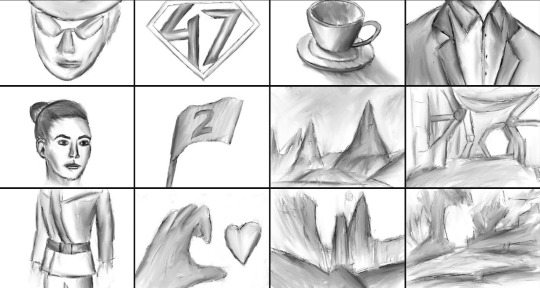
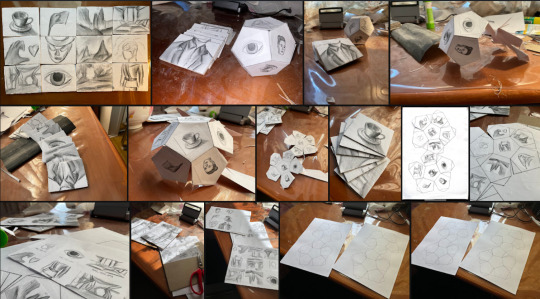
An early attempt at diagramming the flow chart is shown below, which is to display how this game could function at its most basic. It's using the format of a flow chart to visualise, much like our design systems, how a player or possibly a user (depending on the final outcome) could arrive at a decision of the perfect creative prompt or idea.
System mapping:

What these illustrations show are the processes of formulating original conceptual ideas and enacting them, much like how Design works, but for people in the creative industry with a lean in the arts. It is to challenge myself on how a game could operate within the confines of our spaces. To also challenge why we are tempted to resort to generative AI when our imagination can be enough.



To visualise how a mechanic like this works, I had to resort to alternative methods. Diverting from a conventional and linear form of this, I used the spinning wheel as a model for a series of random variable generating machines/tools. Modelled after the double diamond model, I wanted to see if I could establish a 'loop', what people in the gaming community call a cycle of play that sustains itself by how well it is designed. The second image is just me playing with the image composition and seeing where the ideas could take me on a whim.


Processing the first three trial runs, I realised those circular graphics might be a little too sophisticated and convoluted to visualise, so I decided a linear route would be more suitable to share my series of system and mechanics design for the potential board game. The first image is a rough sketch made on Procreate with a quick pencil outlining and dissemination of the paper prototype and its simplistic procedure.
Secondly, the chart on the right side is the refined version mocked up using my Miro board, it is more to the point and cuts out he excess areas of the original sketch and which I will be using for the rest of this course as a guide. At this moment, two deciding contributors would be enough, a dice and a pile of cards will have to do because of the limitations of the semester.
Here is a more refined version of this map that attempts to simplify the layouts:

What should my game do? In the best-case scenario, the outcome should be generative by nature. The investigation I am tapping into is - what if I could teach myself to create an activity to foster imaginative thinking that is more fun than using AI? Not inclined towards GPT or large language models, but helping to guide the player into coming up with an idea. Sort of like a gamified version of Pinterest; to put it very plainly, I can't replicate on the scale of published board games, so I have to be pragmatic about this. In the end, what I believe is that the game should offer a toolkit of a diverse set of options for players to choose from.
Reflection: This week, I was not as productive as I would have liked to see myself, but sometimes, these things happen out of the blue. I knew I did what I needed to do, but the reality was, time was running shorter and better organisation strategies were in dire need. It was daunting to set up my own workshop and table both physically and metaphorically, knowing there is some way forward, but I just cannot fully see it yet. This was the obstacle, and it was real.
Everything around me was clearer, and I could feel the vision being embodied in my work, but there was still more to go. However, a clearly defined system map could only take me so far. Knowing that I had come to terms with the initial plan of AI research being thwarted, I had to abruptly come up with something to compensate. Before proceeding further, I had to interrupt my session with another round of research to adjust the line of sight.
Research/Theory:
Across the vast archive of awe-inspiring talent, Behance was my go-to for existing references and sources of inspiration. I need to look around and know my stuff before getting into the nitty-gritty of it. Online, professional work came from people all over the globe, and I searched for how existing portfolios identify their area of interest and execute their goals. As someone who prized authenticity in my portfolio, I didn't want to produce carbon copies of their work; it was a study of applied methodology and appreciating people who respect the craft and dedicate themselves to it.

Throughout my analysis and noting, I have seen that Projects 2, 3 and 3 were made by creators from different countries, mainly from Europe, all designed for different purposes that go beyond mere entertainment games. Each has its ideocratic system of mechanics that a player must learn to navigate, all comprised of well-developed learning curves. Voss (2024) tells a more straightforward interpretation of these concepts, stating, "systems are about the relationships between things, and then the relationships between those relationships".
When reviewing their designs, Project 1 [Brugelism] has a historical lean for teachers and educators to teach history in a fan platform, making the lessons memorable for audiences and players (Egorova, 2019). Project 2 [Kiwetin] has a fictitious and narrative focus for a younger demographic, helping children and students cultivate artistic thinking and being exposed to the green wildness and its benefits (Paitre & Dombois, 2017). Project 3 [Kintsugi] is tailored for group self-development, with this project being more sophisticated. Made for adults who are in the workforce, with tools provided for them to unwind and reflect on their path in life (Liebute, L., 2021).
What are the connections? After contemplating the research and the existing examples, I had a couple of notes. What they all have in common is a mode of allowing user agency, to captivate a player and maintain this grasp of attention with fed autonomy. Interaction, engagement, and focus - I could see it in its making; evident in the mechanics, the rules and the reward systems. From Project 1, including attributes for historical characters, to Project 3, comprising colour codes for personal topics of discussion, these choices determine the overall perceived impact on the receivers.
After examining the Behance profiles and other creators' portfolios, here are some things I should carry further into my journey. Going down the line, I might narrow it, but these are what I am considering if all goes smoothly:
An original character.
An original artwork.
An original story.
An original sculpture.
What's next? Dig deeper is what I always do, but this time, it really is about courage. The hard approach has good chances of my explorations finding success, but that's a discussion for later. Now, it's time to keep making the answers to challenge myself and my logic/reasoning on why I am making these creations specifically.
My chosen stream is placemaking, so I will need to overhaul my body of work to align with the values of my stream brief. But that task is for much later. The question of whether these exemplars apply to my current project may not be fully answered now, but they will be a part of the answer, if external factors align, such as time management.
References:
Egorova, M. (2019) Bruegelism. Behance. https://www.behance.net/gallery/80988859/Board-game-Bruegelism?tracking_source=search_projects%7Cboard+game&l=5
Liebute, L. (2021). Kintsugi Talk Therapy Game. Behance. https://www.behance.net/gallery/122375331/Kintsugi-talk-therapy-game?tracking_source=search_projects%7Ctabletop+design&l=8
Paitre & Dombois (2017) KIWEIN. behance. https://www.behance.net/gallery/47364353/KIWETIN?tracking_source=search_projects%7Ctabletop+design&l=4
Voss, G. (2024). Systems Ultra: Making Sense of Technology in a Complex World. Verso Books. https://www.versobooks.com/en-gb/products/991-systems-ultra?srsltid=AfmBOoozRujpqMRQeUm2xB3QkL7OxtiL-zhQpIXdQOcfZiG7HsvUoccI
0 notes
Text
Anime Cons and Finding Belonging
True Otaku, a three part documentary that was produced in 2010 and 2011 is an great introduction to Japanese fan culture specifically in the Mid-Atlantic region of the United States. The film visits two anime conventions, Otakon in Baltimore, Maryland and Anime USA near Washington DC. The film focuses heavily on cosplay at these conventions, following a costume creator named Dustbunny who enters a costume that she hand made into a competition at Anime USA. The documentary also features interviews of convention fans, trying to figure out who are “true otaku” in their area.
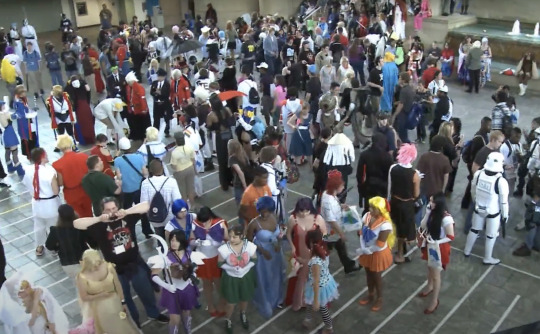
One thing that struck me while watching the interviews and the footage from the two anime conventions in the documentary was how strong of a community that has formed around anime fandom. I’ve seen and mildly been a part of niche communities formed around other special interests like this and it always felt a little different in a way that I found it hard to articulate. Learning more about postmodernism in this course gave me a new framework to make sense of what is going on in these concentrated pockets of subculture. I have heard the term “postmodern” thrown around a lot, but didn’t realize the deep concepts that the term represents.
In the postmodern, a grand, unified narrative no longer exists. Individuals are left to create and discover their own narratives. Narratives that may be fragmented, mixed and change over time. Hiroki Azuma’s Database Animals visualizes this as an underlying database of “moe” elements – pieces that evoke emotion. A person picks and choses from the database to create a custom individual narrative that fits whatever moment and place they find, or even desire to find themselves in. The resulting composite society, with many fragmented narratives forms groups and subcultures rather than a monolithic unified grand culture. For those who have narratives that aren’t common and popular, this can lead to isolation and loneliness. Niche expos and conventions offer a space where those with uncommon narratives can connect with others who share their interests, providing a sense of belonging that counters the isolation from mainstream culture.
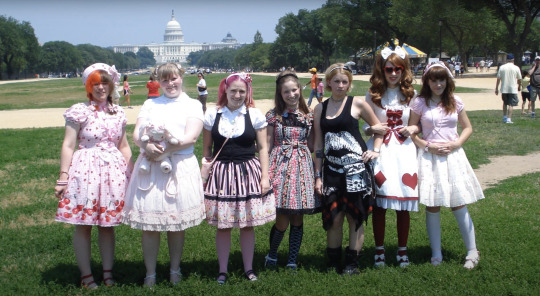
The documentary featured many examples of people finding meaningful connections through anime fandom. One couple in Part II shared their story of how they met at an anime convention and their shared interest grew into a long term romantic relationship. Dustbunny, the cosplay costume creator found fulfillment through designing and competing with her creations. While the conventions may last only a day or two, the creativity and preparation involved extend well beyond the event. Her boyfriend even remarked that she might consider turning her craft into a profession. In addition to winning trophies for her work, she gets to share her knowledge with others who ask for tips and advice. Similarly, the Lolita fashion enthusiasts who gather at anime conventions also formed lasting bonds, organizing meetups at places like zoos, museums, and parks. Tracy, an attendee at Anime USA, captured this spirit in Part III when she said, “whatever you want to do that expresses who you are and what you're interested in and maybe that part of you that people don't quite get—somebody gets it here.” Without a connection to others with similar interests, many of these individuals might feel like outsiders. But shared fandom helps them find friends whose personal “collection of moes” aligns with theirs, creating a space where genuine community can grow.
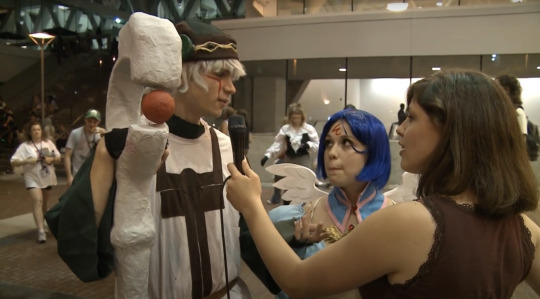
For some people, loss of the grand narrative is deeply troubling. The world is no longer seen as a simple place. There’s not some set of underlying principles that could be discovered – some unifying “theory of everything”. For social beings, this fragmentation can be feel isolating and disorienting. How can we make sense and find meaning? How can we tell who is in our tribe? Anime otaku and fans offer one example of how people can comes together in a postmodern landscape. They’re not unified by a grand narrative, but their by their shared emotional responses and connections to the media and stories that they love.
0 notes
Text
SPQR- Mary Beard; Ch 9
Chapter 8 was a discussion of Roman life at the time. Since it didn’t have much in the historical narrative that I’m trying to document, I won’t comment on it.
9 The Transformation of Augustus
Julius Caesar had no legitimate heirs, so he adopted his great-nephew to make him the beneficiary of his fortune. Gaius Octavius was only 18. He was known as Octavianus, but he didn't use that name himself. His title after 27 BC, was Augustus (revered) and he dominated Roman political life for more than 50 years until his death in 14 BC. The Author writes: "He transformed the structures of Roman politics and the army, the government of the empire, the appearance of the city of Rome and the underlying sense of what Roman power, culture, and identity were all about".
He also transformed himself from a brutal warlord into a responsible statesman.
The face of civil war Fighting for rule of Rome followed Caesar's assassination. Octavian, Marc Antony, and Lepidus had formed a triumvirate to rule, but as they took care of Caesar's assassins, they turned more on each other. Lepidus was squeezed out by 36 BC. By 40 BC, Marc Antony and Octavian had effectively carved up the Mediterranean, with Octavian to the west, and Marc Antony to the east. Meanwhile, Marc Antony had taken up with Cleopatra, and their lavish lifestyle was leading to rumors that he was planning on transferring the capital to Alexandria. The forces met in a naval battle, but Antony's forces were betrayed and overrun. Antony and Cleopatra ran back to Alexandria, where Octavian went looking for them. But both had committed suicide.
Losers and winners There is more to the story though. What we got is a story written by the winner... not necessarily the truth. Augustus undoubtedly embellished the story to portray Antony as a Roman, morally debauched and led astray by the Oriental seductress Cleopatra. He painted his own victory as the triumph of traditional Roman values over the foreign enemy.
The riddle of Augustus Augustus didn’t change much of the Roman governing structure. All the positions continued as before. Augustus himself was more difficult to define, and it seems that was part of his plan. He did write a biography, Res Gestae (What I Did), that tells us what he wanted us to know.
What I did Several items are notable to today's historians. He gives a census number close to 5 million for Roman citizens. He also brags that he enlarged Rome's imperial reach much more than any other leader. He was also wealthy on a scale unheard of, and he used this wealth to act as the patron and protector of Rome. He also engaged in a massive building program in Rome. This laid the blueprint for one-man rule: military conquest, protector and benefactor of the Roman people, construction and reconstruction on a massive scale; underpinned by lots of cash and tempered with a respect for the ancient traditions of Rome.
Power Politics Being the son of the recently assassinated Caesar was no simple matter for Augustus. How could he devise a form of rule that would win over the people, defuse the opposition, and allow him to stay alive? Part of it came down to the language of power. He chose to frame all his powers in terms of regular office holding. He was elected consul repeatedly. Then he arranged to be granted the powers of a tribune, without being a tribunate; the powers of consul without being consul. Undoubtedly people weren't fooled by this, but he was cleverly adapting traditional idioms to serve a new politics, justifying and making comprehensible a new axis of power by systematically reconfiguring an old language.
He also made himself the culmination of all Roman history, so that everything was meant to lead up to him.
However much art, myth, symbol and language played a part, Augustus also made sure he was secure through more practical means as well. He ensured the army was loyal to him and no one else, so that no one else would be able to easily follow in his own footsteps and raise their own private army to take over. He reformed the pension process so that the legions were now paid by the state, not their commanders.
Problems and successions There were a few challenges over the years of Augustus reign, signaling some level of discontent.
Picking an heir was also a problem since Augustus and Livia had no children together. Her son Tiberius was chosen as the heir.
Augustus is dead, love live Augustus Augustus died on August 19, 14 AD. He was succeeded by his step-son Tiberius.
1 note
·
View note